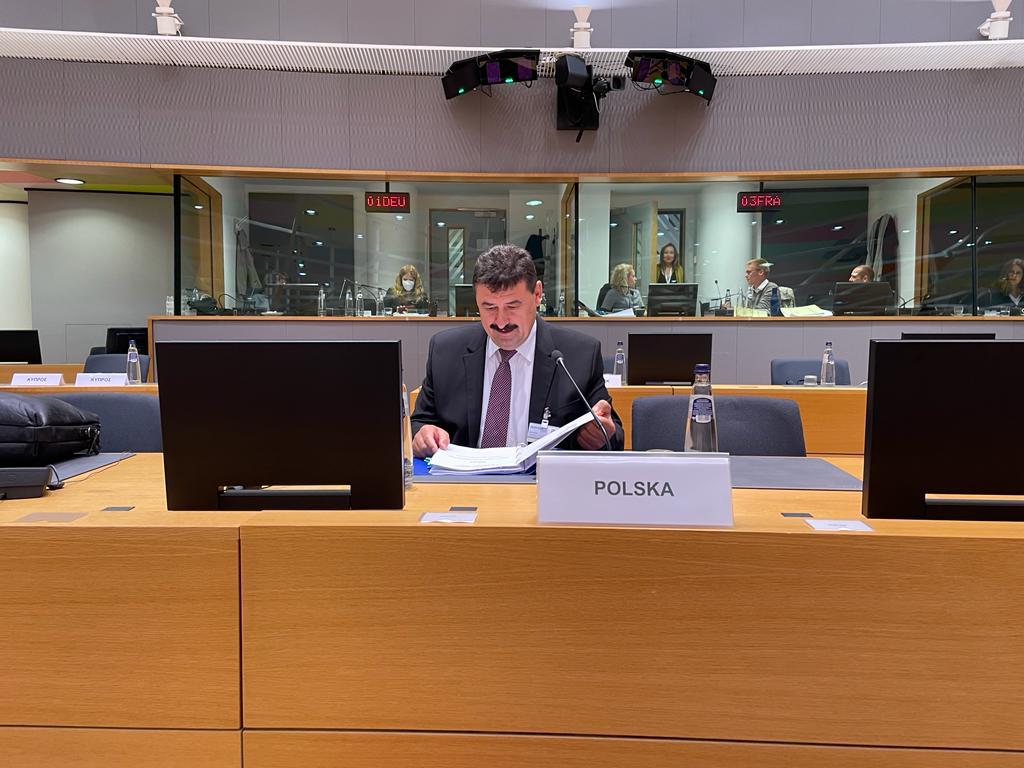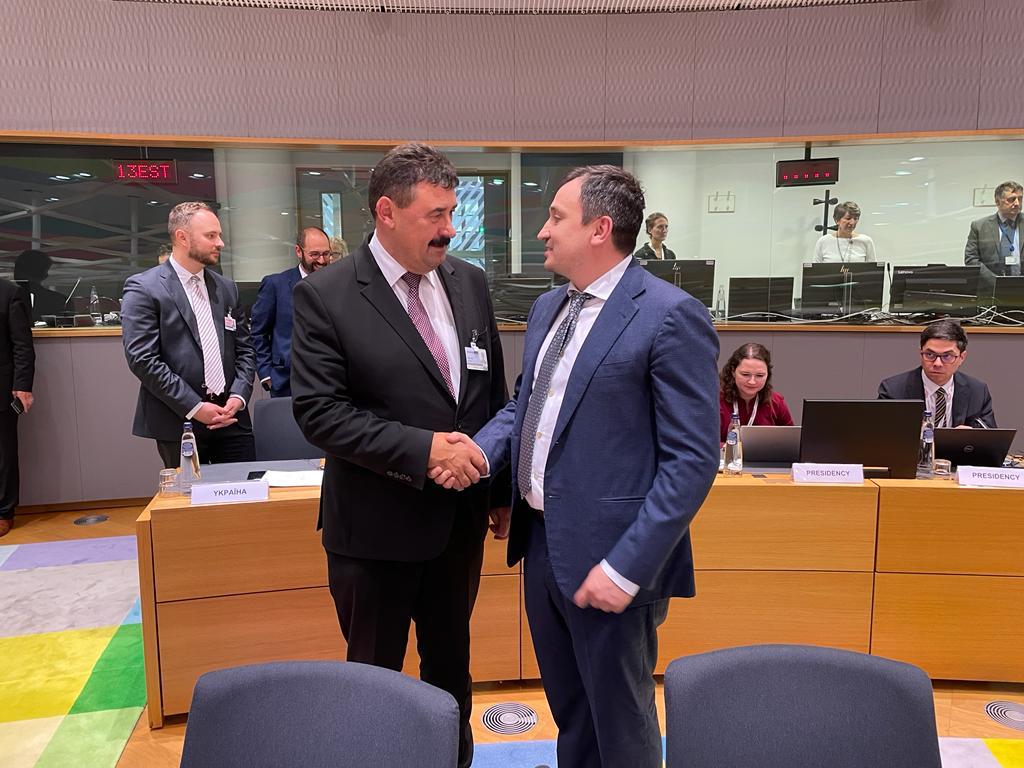AGRIFISH meeting in Brussels
26.09.2022
On 26 September 2022 State Secretary Ryszard Bartosik attended the meeting of the EU Agriculture and Fisheries Council in Brussels. The deliberations focused on both fisheries and agricultural issues.

Main topics:
- fishing opportunities for 2023 for fish stocks jointly exploited with the United Kingdom,
- agricultural production and logistics situation in Ukraine and its implications for the EU,
- agricultural aspects of the revision of the Industrial Emissions Directive and the sustainable use of plant protection products.
Fisheries
In the fisheries section, a discussion took place on preparations for the consultation on fishing opportunities for 2023 for fish stocks managed jointly with the United Kingdom and Norway and within the framework of the Coastal States cooperation.
In the context of consultations with the United Kingdom, Member States pointed to the need for an approach in line with the arrangements under the EU-UK Trade and Cooperation Agreement and urged the EC to take action to safeguard the interests of the EU fleet with a guarantee of a level playing field on both sides.
In the context of the talks with Norway, most Member States stressed that bilateral exchanges of fishing opportunities as well as maintaining access to waters will require a flexible approach to management measures in order to ultimately reach a long-term and sustainable agreement.
Deputy Minister Ryszard Bartosik expressed the hope that the negotiations on fishing opportunities for 2023 for jointly managed fish stocks with the United Kingdom would take place in an atmosphere of mutual understanding and a desire to manage joint stocks based on the best available scientific advice from the International Council for the Exploration of the Sea (ICES) and taking into account the socio-economic situation of the fishing industry.
He said that the fishing industry across the European Union is experiencing the effects of the global crisis, and the war in Ukraine triggered by Russia is further aggravating it.
Referring to the Political Agreement between the European Union and Norway on the joint management of fisheries in international waters of the North-East Atlantic, Deputy Minister Bartosik said that Poland was pleased that the EU share of the Svalbard cod quota had been agreed.
“However, this agreement also an example for cooperation with Norway in the management and setting of quotas for the EU for the Greenland halibut, haddock or redfish. It is thus necessary to ensure that EU has an appropriate share of the fishing quotas in the area, taking into account the historical fishing base,” said Secretary of State Ryszard Bartosik.
He also expressed the hope of starting work on a multi-year mackerel management strategy.
Agriculture
Agricultural production and logistics situation in Ukraine and its implications for the EU
On this item, the agriculture ministers exchanged views on the current situation on agricultural markets, especially the cereals market, and assessed the functioning of the EU-Ukraine solidarity corridors. They expressed solidarity with Ukraine and assured support for its efforts in the fight against the Russian aggression. They pointed out the crucial importance of proper operation of solidarity corridors and called for the continuation of this initiative.
Ukrainian Minister of Agricultural Policy and Food Mykola Solsky also participated in the discussion and identified specific transport and logistics needs, the implementation of which would further improve trade flows.
The EC reported that Ukraine’s cereal exports have virtually returned to pre-war levels, thanks to the operation of solidarity corridors and the opening of Black Sea ports. This has relieved pressure on the world market and contributed to a slight reduction in cereal prices. The EC also pointed to the many challenges the farmers have to face, in particular the rising production costs and climate challenges. In the context of the fertiliser availability problem, it mentioned a proposal to temporarily suspend, as a short-term form of assistance, the import duties on certain fertiliser ingredients. Due to high energy prices, the EC has proposed that the fertiliser industry could benefit from a solidarity fund.
Deputy Minister Bartosik said that the biggest problem in the market today is the significant increase in production costs, including fertiliser, fuel and energy prices, and the impact of grain imports from Ukraine on the farming conditions of Polish grain producers, especially in areas bordering Ukraine, where grain prices are lower than in the rest of Poland. Referring to the EU-Ukraine solidarity corridors, the Deputy Minister gave a positive assessment of their functioning to date and supported their permanent nature.
Deputy Minister Bartosik also stressed that Poland is a key link in supporting Ukraine in the export of its agricultural products.
“We are helping Ukrainian partners to export across the border with Poland as much grain as possible. We have been in close contact with the Ukrainian Ministry of Agriculture since the beginning of the war,” informed the Deputy Minister.
Deputy Minister Bartosik also conveyed that Poland had introduced, among other things, numerous improvements in the performance of border checks of agri-food products. Currently, both because of the war and Ukraine’s expected rapid accession to the EU, new investments are needed at the borders and on transport routes leading to Ukraine.
“I believe that greater involvement and support from the European Union would be needed for the measures taken by the Polish side for many months to increase the capacity of Polish-Ukrainian border crossings,” stressed Deputy Minister Bartosik.
Agricultural aspects of the revision of the Industrial Emissions Directive
In this agenda item, the European Commission presented the scope for amending the provisions of the Industrial Emissions Directive relating to agriculture.
Member States agreed in principle with the need to reduce environmental pressures and work towards sustainable agricultural production. However, most of them considered that the 150 large livestock units (LU) threshold was too low and would result in too many farms being covered. This will increase the administrative burden on both farmers and the administration and will result in adjustment costs for farms. Numerous delegations suggested that the Directive should establish a detailed methodology for setting the threshold for the number of animals per holding, taking into account the conditions in the given Member State.
The EC ensured that the methodology for setting the proposal for stocking thresholds and the rules for implementing the directive were based on objective data. It also stressed that comments from all stakeholders would be heard in further discussions on the amendments.
Deputy Minister Ryszard Bartosik expressed his understanding of the aims of amending the provisions of the Industrial Emissions Directive, which should serve to reduce the environmental pressure exerted by the industry.
However, bearing in mind the need to maintain food security, he stressed that Poland is opposed to extending the current scope of the Directive to cattle rearing and to amending the current thresholds for poultry and pig rearing.
Sustainable use of plant protection products
Together with a number of Member States (Austria, Bulgaria, Estonia, Latvia, Malta, Romania, Slovakia, Slovenia, Hungary and Italy), Poland submitted a request calling on the European Commission to complete an impact assessment for a draft regulation on the sustainable use of plant protection products.
According to the aforementioned countries, the impact assessment presented by the European Commission, raises a number of doubts. It does not clearly and quantitatively answer the fundamental questions regarding the impact of the proposed regulation on food production and food security in the European Union, the increased dependence on food imports, as well as the reduced resilience of the European Union to crisis events.
“The biggest concern is that the current impact assessment underpinning the proposed regulation does not take into account the effects of the war in Ukraine on global food security and the resulting threats to the European Union,” said Polish Deputy Minister.
During the discussion, the majority of delegations agreed that the impact assessment presented did not take into account food security issues and the issue of imports from third countries. Most delegations pointed to the need to supplement the EC’s analysis with a reference to the impact of the war in Ukraine on the EU economy. The European Commission did not announce any revision of the document or the submission of additional studies.
Temporary emergency legal framework for state aid
Under other business, Lithuania presented its note supported by the delegations of Austria, Belgium, Bulgaria, Croatia, Cyprus, Estonia, Greece, Hungary, Italy, Latvia, Luxembourg, Malta, Romania, Slovakia and Slovenia on the extension of the Temporary Emergency Framework for State Aid to support the economy in the context of Russian invasion of Ukraine. Given the continuing consequences of Russia’s military aggression and the energy crisis it caused, the signatories asked the EC to extend the Temporary Crisis Framework until 31 December 2023 with a commensurate increase in the aid ceilings. In addition to the signatories, Lithuania’s application was supported by Poland and Germany.


